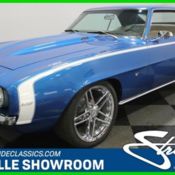|
1979 Camaro Z28 Pro Touring Restomod For Sale. 383 stroker V8 engine, Edelbrock E Tec aluminum heads, aluminum intake, Holley 4 barrel carburetor, MSD electric ignition, aluminum pullys, ceramic coated headers, stainless steel exhaust, A/C, power steering, Wilwood 4 wheel power disc brakes, custom suspension, tubular front control arms, Ridetech coil over shocks and sway bars, 4 link rear suspension, stainless steel fuel tank, upgraded 17" version of Chevy 5 spoke rally wheels with Nitto high performance tires, beautiful bright blue metallic exterior with tri color Z28 graphics, scooped hood and fenders, rear deck spoiler, tinted glass, color keyed sport mirrors, cloth bucket seat interior, tachometer dash, center console, powerful custom built sound system with a Alpine deck, upholstered trunk compartment. You going to be absolutely blown away by handing of this modified classic Camaro, This special build if being offered for a fraction of its build cost so don't hesitate, call us today!!! PRICE $33,900 Automotive History: Dubbed Super Hugger, the second-generation Camaro was developed without the rush of the first generation and benefited from a greater budget justified by the success of the first generation. Although it was an all-new car, the basic mechanical layout of the new Camaro was familiar, engineered much like its predecessor with a unibody structure utilizing a front subframe, A-arm and coil spring front suspension, and rear leaf springs. The chassis and suspension of the second generation were greatly refined in both performance and comfort; base models offered significant advances in sound-proofing, ride isolation, and road-holding. Extensive experience Chevrolet engineers had gained racing the first-generation led directly to advances in second-generation Camaro steering, braking, and balance. Although it began its run with a number of high-performance configurations, as the 1970s progressed, the Camaro grew less powerful, succumbing, like many production cars of the era, to the pressures of tightening emissions regulations and a fuel crisis. Major styling changes were made in 1974 and 1978; 1981 was the final model year for the second-generation Camaro. The biggest changes for 1979 were the introduction of the luxury-oriented Berlinetta model, replacing the Type LT, and a restyled instrument panel with a much flatter appearance than the previous wraparound design (although the gauges themselves remained in the same places as before). The base models, RS and Z28 remained, the Z28s now came with a front spoiler and fender flares much like its Pontiac Trans Am twin had, and now came with Z28 decals that ran from the beginning of the front flares to the bottoms of the doors. Electric rear window defroster became optional this year, replacing the old blower type. Sales for 1979 were the highest ever for any generation Camaro before or since, numbering 282,571 units. Engine choices remained with the 250 I6 standard in the base and RS models, with the 305 2bbl being an option and standard on the Berlinetta.
|
 Home
Home Contact us
Contact us NEWEST CARS
NEWEST CARS SELL YOUR CAR
SELL YOUR CAR FAQ
FAQ


















